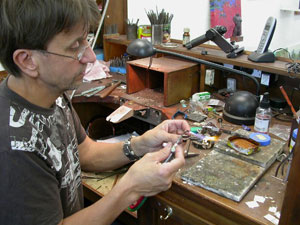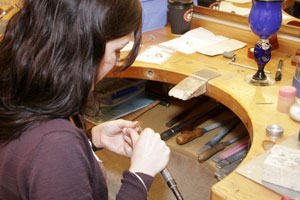Jeweller
Tasks & duties

Jewellers may do some or all of the following:
-
select the metals and gems to be used
-
melt and roll out the metal to be used
-
cut, bend and shape the metal, or cast metal from a plaster mould
-
solder (join the metals), file and polish jewellery
-
make the settings for gems
-
set the gems securely into the pieces of jewellery
-
polish and clean the piece of jewellery once completed
-
repair jewellery
-
create their own designs
-
estimate the value of jewellery, and determine gemstone value by colour, cut, clarity, gem variety and carat (weight)
-
sell jewellery in a retail shop
Experienced jewellers may also teach jewellery-making to small groups of students.
Specialisations
Manufacturing Jeweller
Manufacturing jewellers generally work in private manufacturing workshops or in a workshop in a retail shop, where they produce lines of jewellery or one-offs for retail sale.
Contemporary Jeweller
Contemporary jewellers generally have not completed a formal apprenticeship, and work part-time making one-off commissions or limited edition pieces. They often exhibit and sell their work in places like art galleries.
Skills & knowledge

Jewellers need to have:
-
knowledge of jewellery styles and designs
-
knowledge of metals and alloys
-
knowledge of gemstones and their value
-
knowledge of different methods of cutting and setting gemstones
-
technical skills
-
maths skills
-
design skills
-
problem-solving skills
Entry requirements
To become a qualified jeweller you need to complete an apprenticeship and gain a New Zealand Trade Certificate. As an apprentice, you can also attend courses in manufacturing jewellery.
The Jewellery Registration Board oversees apprenticeships for jewellers. Some people also work as self-employed, part-time art jewellers without specific apprenticeship training.
Secondary education
School Certificate or NCEA equivalent English, maths, science, and metalwork is preferred. Art and design subjects are also useful.
Tertiary education
Doing a year-long pre-apprenticeship course, like the Jewellery Registration Board endorsed Open Polytechnic course, is recommended by most senior jewellers and employers. However, as there are only approximately 40 people doing jewellery apprenticeships at one time these courses do not guarantee an apprenticeship.
Useful experience
Useful experience for jewellers includes as a salesperson, draughtsperson or jeweller's assistant.
Related courses
Crafts
Jewellery Making
For more information, please refer to Career Services.
Document Actions
